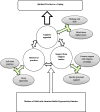Spiritual practices as coping with mothers of children with attention-deficit hyperactivity disorder: a qualitative explorative study
- PMID: 39748375
- PMCID: PMC11697869
- DOI: 10.1186/s40359-024-02331-2
Spiritual practices as coping with mothers of children with attention-deficit hyperactivity disorder: a qualitative explorative study
Abstract
Background: Mothers of children with ADHD struggle with everyday challenges that exceed from the signs and symptoms of ADHD. They have applied different coping mechanisms, comprising spiritual practice commitments. The study aims to explore spiritual practices as a coping mechanism for mothers of children with ADHD.
Method: Qualitative exploratory research methodology was conducted with 22 mothers who were selected via purposive sampling. Semi-structured interviews were conducted, and the data were analysed via thematic analysis.
Results: The findings were discussed with three main themes and six subthemes:01) cognitive appraisal-thinking with faith and belief about higher power; 2) behavioral practices-individual practices and group approaches; and 3) support from religious leaders-common support with religious concepts and specific personnel support.
Conclusions: This study discussed the religious commitment as coping of mothers, who used them as coping mechanisms while caring for a child with ADHD. They found a variety of culturally bound religious practice methods that were reported to be perceived as effective for their mental well-being.
Keywords: ADHD; Coping; Mothers; Practices; Religious; Spiritual.
© 2025. The Author(s).
Conflict of interest statement
Declarations. Ethics approval and consent to participate: Ethics approval was obtained from the Ethical Review Committee in the Faculty of Medicine, University of Ruhuna, Sri Lanka, under the number of human research studies 2022/P/087 and all methods were performed under relevant guidelines and regulations. Relevant administrative clearance was also obtained. The study mothers were allowed to give informed consent and participate voluntarily. They had the capability to withdraw from the research study at any time without any consequences. Consent for publication: Not applicable. Competing interests: The authors declare no competing interests.
Figures
References
-
- Varrasi S, Boccaccio FM, Guerrera CS, Platania GA, Pirrone C, Castellano S. Schooling and Occupational Outcomes in Adults with ADHD: Predictors of Success and Support Strategies for Effective Learning. Education Sciences. 2023;13(1):37. 10.3390/educsci13010037. - DOI
-
- Barkley RA, Cunningham CE, Gordon M, Faraone SV, Lewandowski L, Murphy KR. ADHD Symptoms vs. Impairment: Revisited. ADHD Report. 2006;14(2):1–9. Available from: 10.1521/adhd.2006.14.2.1. - DOI
-
- Danielson ML, Bitsko RH, Ghandour RM, Holbrook JR, Kogan MD, Blumberg SJ. Prevalence of Parent-Reported ADHD Diagnosis and Associated Treatment among U.S. children and Adolescents, 2016. J Clin Child Adolesc Psychol. 2018;47(2):199–212. Available from: 10.1080/15374416.2017.1417860. - DOI - PMC - PubMed
MeSH terms
LinkOut - more resources
Full Text Sources
Medical



